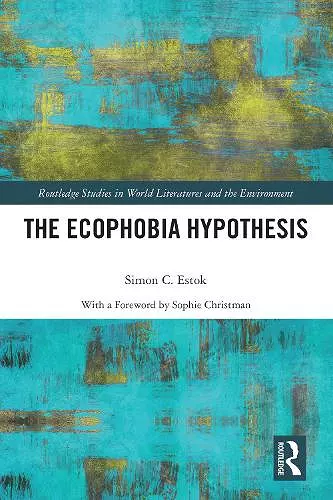The Ecophobia Hypothesis
Understanding the Fear of Nature and Its Implications
Format:Hardback
Publisher:Taylor & Francis Ltd
Published:19th Jun '18
Currently unavailable, and unfortunately no date known when it will be back
This hardback is available in another edition too:
- Paperback£42.99(9780367616649)

This insightful book, The Ecophobia Hypothesis, explores the limitations of biophilia in understanding human-environment relations and the role of ecophobia in our ecological crisis.
The Ecophobia Hypothesis emerges from the recognition that the biophilia hypothesis, while valuable, has limitations in explaining human-environment relations. This volume presents a series of interconnected discussions that explore the new material turn and the pressing need to consider the agency of genetics. It argues that while biophilia captures ideal human connections with nature, it fails to account for the complexities of the Anthropocene, an era marked by significant environmental challenges.
By broadening the understanding of biophilia, the Ecophobia Hypothesis posits that it is essential to explore the darker aspects of human interactions with the natural world. The book delves into the concept of ecophobia, suggesting that fear and anxiety towards the environment can hinder our ability to engage positively with it. Through a rich tapestry of comparative analyses, the text examines how ecophobia affects our perceptions and actions regarding environmental issues.
Moreover, this work investigates the implications of ecophobia on contemporary ecomedia, questioning why this thriving industry has yet to produce significant changes in our environmental practices. The Ecophobia Hypothesis seeks to uncover the roots of ecophobia and advocates for transformative change by addressing the systemic issues that contribute to our current ecological crisis. It highlights the need for a deeper understanding of environmental ethics and the socio-political dynamics that shape our relationship with nature.
Well researched, vigorously argued, and capaciously framed, The Ecophobia Hypothesis culminates years of careful work by Simon Estok on the intimacy of contemporary environmental catastrophe to an enduring human fear of the natural world—a horror that needs to be thought alongside the much documented love of life which occupies much environmental writing. This book will deeply unsettle its readers. Yet it also offers wider historical, psychological, and material understandings of how we arrived at our state of unremitting crisis ... and why disruption of our comfortable eco-epistemological frameworks is so necessary now. —Jeffrey J. Cohen, Co-President, Association for the Study of Literature and Environment (ASLE), Dean of Humanities, Arizona State University, USA
At the conclusion of his much anticipated, deeply learned, and clearly written study Simon Estok writes that "Understanding how ecophobia prompts environmental injustice (and environmental racism) produces a more comprehensive and wider understanding of the mutually reinforcing ethics that bring about oppression and suffering—social and environmental. Understanding this is what the ecophobia hypothesis seeks." Beginning with exposing the human fear of nature, Estok considers a fresh methodological model in the examination of our complicity in climate change, the most pressing concern of our times. The Ecophobia Hypothesis is essential reading for all students of interdisciplinary literary studies, critical theory and concepts, feminist literature and theory, and of course environmental studies. —William Baker, Distinguished Professor Emeritus, Northern Illinois University
Simon Estok has written his long-awaited, masterful, invigorating, exhaustive, and unequivocally convincing thesis that confronts and corrects the notion of biophilia. Estok is at his very best here. Sure-footed on the slopes of theory, graceful on wing in the skies of controversy, and unrelenting in the arts of persuasion, Estok dazzles with his wide-ranging discussions about ecophobia—discussions that range from the dangerous shoals of genetic materialism to the more calm waters of ecomedia, animal studies, and evolutionary psychology. From its startling insights about "hollow ecology" and "junk agency" to its unapologetic stance arguing the necessity of acknowledging the dark, antagonistic, and exploitative responses and reflexive fears that characterize so much of the collective human response to nature, The Ecophobia Hypothesis is a "must-read" for anyone in the environmental humanities. —Dr. Jonggab Kim, Director of the Body Studies Institute, Konkuk University, Seoul.
Human interactions with the nonhuman world exhibit affinity, antagonism, and a vast array of complicated emotions between the two extremes. The psychology of human attitudes and actions toward nature is fascinating and difficult to explain. Relying on the evidence he finds in a wide range of cultural texts, Simon Estok explores the dark and fearful part of the emotional spectrum in this provocative study of "ecophobia." This may help to explain why our civilization treats the planet so callously. —Paul Slovic, Professor of Psychology, University of Oregon
The irrational fear of the things and beings of the natural world finds its best conceptualization in Simon Estok’s The Ecophobia Hypothesis. Estok’s riveting conjectures on ecophobia are not only theoretically cogent but also provide affective and cognitive insights into the darkness of human reflexes that induce what he calls "hollow ecology." Estok entangles the reader in the ecopsychological and ecocultural swings of the ecophobia condition through the intersecting mirrors of genetic materialism, animal studies, ecomedia, and ecopsychology. This book will open many eyes to the disquieting reality of humanity’s ecological unconscious and liberate the reader from the existential trouble that this unconscious represents. —Serpil Oppermann, President, the European Association for the Study of Literature, Culture, and the Environment of (EASLCE).
This bracing and wide-ranging book demonstrates the importance of Estok’s concept of ecophobia not only for ecocriticism and ecomedia studies, but for combating the proliferation of waste, the systemic violence toward nonhuman creatures, and the degradation of planetary life. — Stacy Alaimo, Co-President of ASLE (Association for the Study of Literature and Environment ).
ISBN: 9781138502055
Dimensions: unknown
Weight: 430g
198 pages